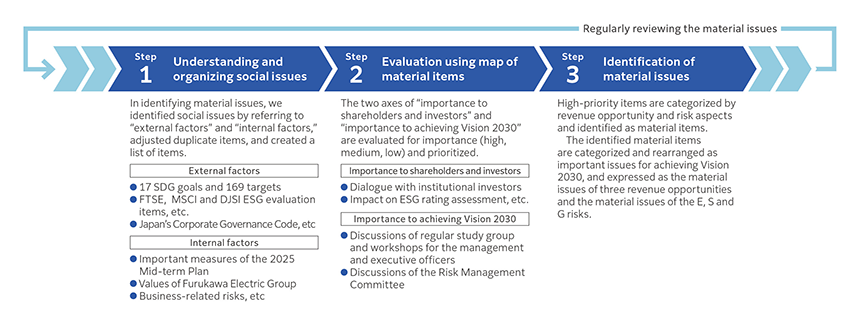In order to achieve Furukawa Electric Group’s Vision 2030, we are promoting ESG management, which aims sustainable growth of the Group and medium- to long-term growth of corporate value.
We have defined material issues* as important management issues that the Group should address in order to achieve the Vision 2030, and we defined material issues in terms of both revenue opportunities and risks, in accordance with the process of identifying material issues as mentioned below. We aim to achieve the Vision 2030 by working on the material issues we have identified, considering that addressing the material issues in terms of revenue opportunities help improve capital efficiency whereas addressing the material issues on risks help reduce the cost of capital. We will also contribute to the achievement of the SDGs, which are closely related to the material issues.
* In Furukawa Electric Group’s ESG management, “material issues” are defined as important management issues that Furukawa Electric Group must address in order to achieve the Vision 2030, and are used as a term with a meaning different from those used in the finance and accounting context, which are issues that may have an impact on business performance, financial position, etc.

From the perspective of revenue opportunities, in order to help solve various social issues through the business activities of Furukawa Electric Group, we found it indispensable to devise a transformation from the emphasis on “product-out” to the “market-in" and further to the “outside-in” approach, and identified the “Creating of businesses that solve social issues” as a material issue. Examples of these include the “Creating of businesses that support the next-generation infrastructure,” which will serve as the foundation of the society anticipated in the Vision 2030, and the “Creating of environment-friendly businesses,” which contribute to the realization of a carbon-free society and a recycling-based society. We are focusing on the two kinds of examples as sub-material issues of the material issues on revenue opportunities. In addition, we have identified as material issues the slogan “Open, Agile, Innovative,” which reflects the desire to become a company that actively transforms itself and the creation of continuous innovation through utilizing intellectual property and other measures, and the “Building partnerships with various stakeholders,” focusing on co-creation with others, as key management issues toward creating businesses that solve social issues.
On the other hand, from a risk perspective, in order to achieve sustainable growth, it is essential that companies develop business activities that take into account climate change, and we see this as a material issue for environment (E) risks. In addition, in order to become a company that actively transforms itself, we set the “strengthening human capital and organizational execution abilities” as a material issue for social (S) risks. As for material issues of governance (G) risks, we focus on “building a governance system to strengthen risk management” including corporate governance, group governance, supply chain management as well as human rights and labor practices as sub-material issues.

Identification and review of material issues was conducted through a process of Step 1 through Step 3. First, in Step 1, we identified social issues by referring to “external factors” and “internal factors,” adjusted duplicate items, and created a list of items (currently organized into 29 items). In Step 2, the two axes of “importance to shareholders and investors” and “importance to achieving the Vision 2030” are evaluated for importance (high, medium, low) and prioritized. In Step 3, high-priority items are identified as material issues. The identified material issues are categorized by revenue opportunity and risk aspects and rearranged as important issues for achieving the Vision 2030, and expressed as the material issues in terms of revenue opportunities and the material issues in terms of the E (Environmental), S (Social) and G (Governance) risks.

